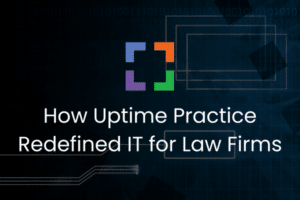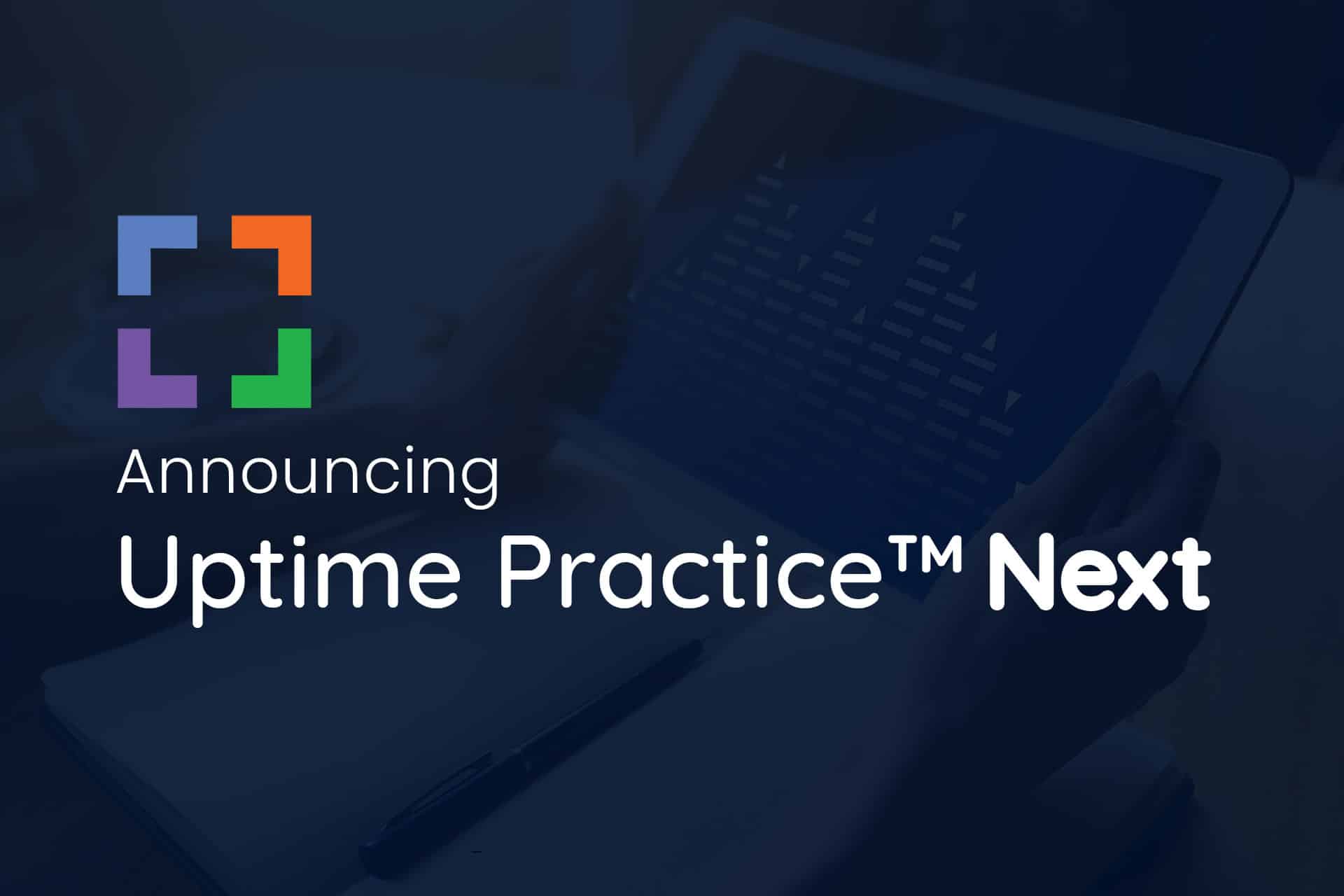How Uptime Practice Redefined IT for Law Firms
 Our CEO, Dennis Dimka, shares his personal journey and the strategic pivots that have defined our growth and specialization in the legal industry.
Our CEO, Dennis Dimka, shares his personal journey and the strategic pivots that have defined our growth and specialization in the legal industry.
From early days as an IT student to pioneering cloud solutions for law firms, this story isn’t just about technological evolution — it’s about a vision to transform legal practice management.
Join us as we explore the key decisions, innovations, and future aspirations that have shaped Uptime Practice.
The Early Days
Prior to 2005, Uptime Practice’s CEO Dennis Dimka was a salesman by day, IT student by night. Upon graduation, he landed a gig as an entry-level IT administrator for a local Minneapolis company.
Fresh out of college, Dennis was responsible for basic IT tasks, while an expensive outside IT consultancy (“the big guns”) was brought in for the more advanced tasks.
“Over not too much time, I realized I could do everything the overpaid IT consultant was doing but better. And I demonstrated that to my boss, so I quickly moved up in the company.
But that experience made me realize that I could do that too, be an IT consultant and work for myself.”
So, in 2005, a one-man IT consultancy was born — Uptime Systems.
It started as many businesses do — slowly. But with Dennis doing fieldwork for local Minneapolis businesses, word spread, and by early 2008, Uptime Systems had grown into a team of 5.
“Around this time, we began transitioning to a more structured, client-centric MSP offering. Under that model, clients pay a fixed monthly fee that covers proactive IT management and many of the day-to-day IT needs a small business would have.”
Essentially, Uptime was selling servers to small businesses in Minneapolis. The initial cost for the server and installation was high — the equipment alone being quite expensive — with a monthly fee to manage and maintain the server while providing customer support.
Then, in 2009, before “the Cloud” was really even defined, Uptime pivoted again — to a model that would reduce overhead for clients and offer a more scalable IT solution.
“We thought it’d be cool if we bought a massive server, cut it up into slices, and rented it out… not unlike buying a building and renting out apartments.
So we built it out and pitched it… the pitch was simple. We’d say to a client: listen, for a lot less upfront, we can get you into this environment, you just pay as you go. If you need more space, we can add it, If you need to downsize, we can do that too. It’s scaleable, flexible. And you get out of that cycle of every three to five years doing a massive server hardware refresh, which is expensive for small businesses.”
They called this new offering VirtualWorkplace. It used virtualization — allowing multiple virtual servers to run on one physical server — combined with Terminal Server technology (which today is known as Remote Desktop Service).
It enabled users to log into a virtual desktop that went full screen and provided a typical Windows desktop environment. All of the users’ applications were hosted and could be interacted with inside this virtual environment.
Would You Rather: Serve Clients or Manage IT?
Use Uptime Practice Next for:
- Unlimited IT Support
- Legal Software Consultation
- Cloud Storage
- Security Protection
- Data Backups
- and More!
At the time, the concept was novel and innovative. It let businesses move on from the need for extensive and expensive on-premise hardware to a technology that was both more functional and more efficient.
The success of VirtualWorkplace set the foundation for what Uptime Systems is today, going all in on cloud offerings and shortly thereafter niching down into the legal industry.
“We grew fast, but acknowledged to keep growing, we would need to really specialize and focus on a single vertical market. Almost any business would benefit from our new approach of private cloud… but we realized that the legal industry, especially, had a lot to gain from this new model.”
Time is, quite literally, money for lawyers, and they really can’t afford the downtime or other issues with on-premise servers. They’re doing important things, like solving custody disputes or helping people immigrate to the U.S… and an hour of downtime could literally cost them hundreds of dollars.
And there’s a lot of pressure put on law firms from their bar association to be secure, have good backups, good security, and the truth is that a small law firm with a couple of on-premise servers… there’s just no economically feasible way to bring that level of enterprise security.
Whereas in the cloud world, we could build a Fortune-500 calibre infrastructure and share it out incrementally with our customers… so they could get that level of security. The benefits were just huge for the legal industry.
From there we re-engineered our company, top to bottom, to serve the technology needs of the legal industry. We reworked all of our offerings, most notably VirtualWorkplace, and finely tuned our products, services and how we delivered them to the nuanced needs of law firms.
And the star on the Christmas tree was when we changed our name from Uptime Systems to Uptime Legal Systems.”
Innovating at the Speed of Law: How Uptime Practice Stays Ahead
The product that began as VirtualWorkplace was rebranded and evolved into what is now known as Uptime Practice (as a nod to helping you run your practice management software).
From there, they continued to grow by forging relationships with the main legal software makers who were themselves trying to meet the demand of the market. Because by this point, the cloud had taken off, and the demand for cloud versions of already popular software had grown.
“Rewriting software from scratch is a huge undertaking… so we forged mutually beneficial relationships with existing legal software providers, bringing their software to the cloud. And we continued adding more software overtime while also optimizing Uptime Practice for each of these products.
The idea, really, and what no one else was doing, was that you can take any of your common legal practice management apps like ProLaw, Tabs3, PCLaw, and Time Matters and it just works, in the cloud, with Uptime Practice.”
How Uptime Practice Plans for the Future
Uptime Practice’s client base is a built-in sounding board for new and innovative ideas.
“To make sure we’re future-focused, we keep our ear to the ground. It’s about listening to what our clients are telling us during consultations. You know, our sales process is deeply consultative… it’s not just about selling a product but understanding the challenges law firms face.
We ask a lot of questions. We want to know what lawyers are struggling with, what’s challenging them. It’s a conversation. And sometimes we point people to products outside of our own, and that’s okay. But when that does happen, we take note and that’s what drives our growth.
That’s what’s really driven our product line. Today, we have three discreet lines of business at Uptime Legal, and we’ve expanded. Uptime Legal Systems now includes JurisPage, a law firm marketing company, and LexWorkplace, a legal document management application. And these, really, were created to meet the needs of our clients.”
Looking to the future, Dennis sees Uptime Legal Systems growing to become the “Google of Legal Tech.”
“We’re always looking for new ways to bring value to the lawyers we work with. We got to where we are today by embracing new technology, and we’ll continue to do that. We have some exciting plans in the works with AI and have high hopes for our other lines of business too. We’re getting amazing feedback on LexWorkplace and JurisPage and really just want to keep making our products more and more useful.”
Uptime Legal Systems
Named an Inc. 5000 Fastest Growing Private Company for the Past Seven Years: Uptime Legal is North America’s leading provider of legal technology services. As a full-spectrum legal technology company, Uptime Legal provides Private Cloud, Document Management Software, and Digital Marketing to law firms across North America.
Uptime is based in the US and has offices in Minneapolis, MN, and Calgary, Canada.
Related Posts
June 11, 2024
Which Uptime Practice Solution Is Right for You?
March 2, 2023
Introducing Uptime Practice Go
September 13, 2021


